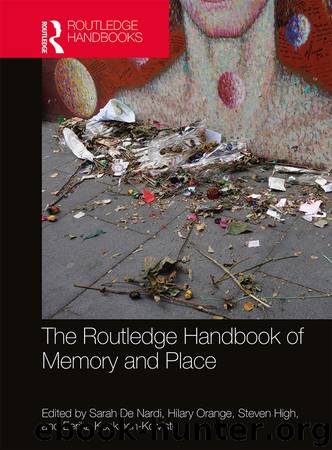The Routledge Handbook of Memory and Place by Sarah De Nardi;Hilary Orange;Steven High;Eerika Koskinen-Koivisto;

Author:Sarah De Nardi;Hilary Orange;Steven High;Eerika Koskinen-Koivisto;
Language: eng
Format: epub
Publisher: Taylor & Francis (CAM)
Published: 2019-08-06T16:00:00+00:00
19
‘Hidden in plain sight’
Uncovering the gendered heritage of an industrial landscape
Lucy Taksa
Introduction
The impact of industrial heritage on men and masculinity continues to be a subject explored by sociologists and historians who note the paradoxical ways in which traditional industrial masculinity remains both visibly and invisibly influential, particularly in certain, de-industrialised locales (Roberts 2014; Ward 2015; Thurnell-Read 2016; Walker & Roberts 2018). As Salzinger noted, ‘masculinity’s historically accrued capacity to stand in for the general’ has been enabled by the ‘absence of explicit naming’ (2004: 13). As a result, in her words, the ‘unelaborated “worker” is always (already) male,’ meaning ‘that, socially, femininity is often specified, by name or by highly explicit conventions around embodiment, whereas masculinity literally ‘goes without saying.’ ‘Hidden in plain sight, masculinity is easy to miss, whereas the embodied frill of femininity intrudes on the field of vision’ (Salzinger 2004: 15).
A decade ago, Smith noted that ‘gender tends to be overlooked in discussions of heritage’ (2008: 159) and is often invisible in heritage practices (Smith 2008: 165). The promotion of a masculine ‘vision of the past and present’ through male-centred stories (Smith 2008: 159) is also reinforced by the marking of women and femininity. As Reading (2015: 401) pointed out more recently, gendered approaches to heritage have ‘tended to use a simplistic framework in which gender is telescoped into a focus on women.’ Accordingly, heeding Reading’s advice, this chapter considers how ‘constructions of masculinity and femininity interact with what is valued and included as heritage’. In order to uncover these relational aspects of gender, in time and in place, and ‘whose identities are being “represented and reinforced” ’ (Reading 2015: 401), I consider past assessments and representations of the significance of one industrial place, the memories of those who once worked there and interpretations of their current heritage significance. In doing so I aim to provide one example of how the close association between industrial heritage, men, and masculine perspectives continues to dominate interpretations and management of industrial heritage (Labadi 2007: 162; Reading 2015: 404; Taksa 2003).
How has this masculine perspective been transmitted and reinforced over time? To address this question, I examine various ‘vehicles of memory’ (Confino 1997: 1386), including documentary and oral archival sources and more recently produced heritage assessments related to the past and present of the Eveleigh Railway Workshops in Sydney. Beginning with a consideration of the way the site was viewed and valued in newspapers and journals during its heyday, I then present memories of retired male workers who were employed at Eveleigh during the Second World War when the predominantly male workforce was augmented by women munition workers. In this way I contrast the unmarked masculinity associated with the site’s industrial operations with the way the male workers remembered the women munition workers in terms of their femininity, marking them as outsiders. Finally, I reflect on the intersections between memory, place, and gender by reviewing how proposals for the site’s heritage interpretation naturalise and legitimate the ‘androcentric assumptions and messages’ (Smith 2008:
Download
This site does not store any files on its server. We only index and link to content provided by other sites. Please contact the content providers to delete copyright contents if any and email us, we'll remove relevant links or contents immediately.
Cecilia; Or, Memoirs of an Heiress — Volume 1 by Fanny Burney(32548)
Cecilia; Or, Memoirs of an Heiress — Volume 2 by Fanny Burney(31947)
Cecilia; Or, Memoirs of an Heiress — Volume 3 by Fanny Burney(31932)
The Great Music City by Andrea Baker(31917)
We're Going to Need More Wine by Gabrielle Union(19034)
All the Missing Girls by Megan Miranda(15958)
Pimp by Iceberg Slim(14488)
Bombshells: Glamour Girls of a Lifetime by Sullivan Steve(14057)
For the Love of Europe by Rick Steves(13915)
Norse Mythology by Gaiman Neil(13349)
Talking to Strangers by Malcolm Gladwell(13349)
Fifty Shades Freed by E L James(13233)
Mindhunter: Inside the FBI's Elite Serial Crime Unit by John E. Douglas & Mark Olshaker(9324)
Crazy Rich Asians by Kevin Kwan(9279)
The Lost Art of Listening by Michael P. Nichols(7494)
Enlightenment Now: The Case for Reason, Science, Humanism, and Progress by Steven Pinker(7306)
The Four Agreements by Don Miguel Ruiz(6745)
Bad Blood by John Carreyrou(6611)
Weapons of Math Destruction by Cathy O'Neil(6265)
